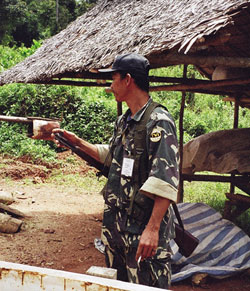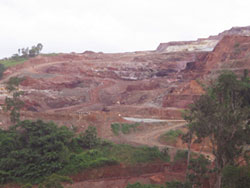
A community in crisis
Mining activities on Subanon Indigenous territory in the Philippines have divided communities and had adverse effects on the people's land, traditions and wellbeing
By Danny Gillis
September/October 2007
Return to Table of Contents
Print Article
"I have never seen anything so systematically destructive as the mining program in the Philippines. The environmental effects are catastrophic as are the effects on lives."
So wrote British Member of Parliament Clare Short in her introduction to a scathing report on the mining industry in the Philippines, released earlier this year. Ms. Short, the former Secretary of State for Overseas Development for Great Britain led a fact-finding team that investigated the industry's impact on human rights and the environment. The four-person team described witnessing "first-hand the havoc mining is wreaking on the livelihoods, health and human rights of indigenous peoples and other local communities...and saw the potential for massive environmental damage to critical water catchment areas, thousands of hectares of agricultural lands and the marine environment."
The Philippine bishops have called for the repeal of the Philippines Mining Act of 1995, legislation that has resulted in a stampede of foreign companies acquiring permits to mine in the Philippines. These include permits in 17 important biodiversity areas, 35 national conservation priority areas, and 32 national integrated protected areas.
The bishops say, "The promised economic benefits of mining by these transnational corporations are outweighed by the dislocation of communities especially among our indigenous brothers and sisters, the risks to health and livelihood and massive environmental damage."
"Our land is rich," say the bishops, "yet over-exploitation threatens the future of our people. We must therefore guard our non-renewable resources, like minerals, to ensure sustainable development of our land for the sake of future generations."
One of the operations cited in the report is an affiliate of a Calgary-based mining company, TVI Pacific Inc. The affiliate is mining for gold on Mount Canatuan, a sacred site of the Subanon indigenous people on the island of Mindanao. The company strongly disputes the findings contained in the British report. TVI also contests a 2007 report by the Canadian human rights agency Rights and Democracy, which concludes that TVI's arrival has "had a negative impact on (the Subanon's) right to self-determination and on their system of governance" and "has contributed to a militarization of the area."
On April 11, a group of five Philippine Catholic bishops wrote to the Canadian Church saying, "We would like to appeal to your kind intervention about our problem involving TVI, whose large-scale mining operation is wreaking havoc upon our land and people." The bishops claim that TVI's open-pit mining operation has resulted in plundered mountains, destroyed forests and contaminated lands, creeks and rivers. To produce up to three grams of gold, the company has to excavate at least one ton of soil and stone. TVI is processing 1,800 tons of stone and soil daily.
The Philippine Bishops Conference has also called for TVI to halt its operations (see sidebar) and in June of this year, Scarboro Missions' General Chapter supported the bishops "in their plea to the Canadian mining corporation TVI to immediately cease their mining operations in the area of Mindanao because of the abject devastation to the land which is essential to the present and future livelihood of the indigenous communities who have always lived in these areas."
Struggling to control their development
For centuries the Subanon (meaning river-dwellers) have inhabited the territory which includes Mount Canatuan in the municipality of Siocon. They were among the first indigenous communities in the Philippines to be awarded a Certificate of Ancestral Domain Title. Their stewardship over the land was recognized in 1992, their claim to the land was granted in 1997, and in 2003 President Gloria Arroyo personally handed a title document to Boy Anoy, their timuay (traditional leader). The title awarded Timuay Anoy's group more than 8,000 hectares of ancestral domain. During this lengthy process the Philippine government granted TVI a permit to mine on 508 hectares of this land.

PHOTO CREDIT: Catherine Coumans, Mining Watch Canada
A private TVI security guard on a public road on the way to the TVI mining site. He was stopping traffic and screening people to decide who may pass through. Photo circa 2004.
TVI's operations on Mount Canatuan have been highly controversial since exploration began in 1994. As early as 1997, the Subanon of Mount Canatuan began requesting that TVI's mining permit be revoked. In July 2001 Onsino Mato, Secretary General of the Siocon Subanon Association, Inc., appeared before the United Nations Working Group on Indigenous Populations. Mr. Mato told the committee that TVI did not consult the people before moving into their territory, nor listen to their opposition to large-scale mining. Instead, he added, TVI attempted to sow division within the community.
Other Subanon groups and leaders such as the Timuay Anoy agree with this assessment. "TVI is hell to us," he says. "For so many years we strived to gain the title to our ancestral land. Now we have no say in how to develop our lands because of TVI."
Free, prior and informed consent
At the heart of the dispute is the claim by Subanon leaders that TVI was never given permission to mine within their ancestral domain. Both the Philippine Indigenous Peoples Rights Act and the country's Mining Act require that indigenous people give their free, prior and informed consent before any mining projects proceed within their territories. However, reports of legal guidelines being violated and consent being "engineered" are all too common.
In 2002, the Philippines Commission on Human Rights concluded that TVI had failed "to obtain free, prior consent from the indigenous people as the law requires." Now, though, the company claims that it has the support of at least two groups representing the Subanon. The first of these two groups was formed in 2001 when pro-TVI Subanon, predominantly from outside the ancestral domain, gained leadership of the Siocon Subanon Association Inc. under contested circumstances and in opposition to traditional Subanon leadership.
The second pro-TVI group, the Siocon Council of Elders, was set up in 2002 by a Philippine government agency, the National Commission on Indigenous Peoples (NCIP), in an attempt to end divisions among the Subanon. A Memorandum of Agreement signed between this group and TVI forms the basis for the company's claim that it has received consent from the Subanon to operate in their territory. Yet, the highest traditional Subanon authority in the region rejects the Council of Elders as being "illegitimate, illegal and an affront to the customs, traditions and practices of the Subanon." It has called on the NCIP to nullify all agreements the Council made and for consent to be sought through the legitimate traditional Subanon leadership. TVI insists on the legitimacy of its consent and publishes much that discredits the Subanon's traditional leaders who oppose the mine.
Impact of TVI operations
In its 2006 Annual Report, TVI contends that through its various programs, it "has made sustainable community development possible at Canatuan." TVI also claims to have brought numerous benefits to the area. These include employment and various programs to improve health, education, water and electricity services. The company also pays a legally required one percent royalty on gross revenue to the pro-TVI Siocon Subanon Association Inc.
Others compare TVI's entry into the community to the Trojan Horse. Their claims illustrate how large-scale mines promoting community development benefits can in fact divide communities and have an adverse effect on their present and future wellbeing. Downstream farmers and fishers say that increased sediment in the water impacts their livelihoods. Militarization of the area has also occurred. The Philippine Commission on Human Rights has documented numerous complaints of human rights abuses by the security force employed by TVI. The abuses include acts of violence and intimidation, blockage of supplies such as food and construction materials, and obstruction of the free movement of the Subanon. The security force of 160 auxiliary soldiers maintains armed checkpoints on the only road into TVI's claim area.
Mount Canatuan and particularly its peak are considered sacred sites by the Subanon. TVI refuses to recognize this. The peak is the site of the boklog, a thanksgiving ritual held every seven years to honour the spirit of the waters, the spirit of the mountain and the spirit of the forest. TVI's strip mine has destroyed much of the mountain including the peak of Mount Canatuan. Now, says reporter Ellen Reed of Inside Mindanao, "Mount Canatuan cannot be missed. It is the only mountain in the highlands of the town of Siocon where a huge portion of the mountain is colour brown, a result of the open pit mining."
Still, the Subanon struggle to retain what is left of their land. "This land contains places sacred to us," says one farmer. "We have nowhere else to go. Our deepest desire is to secure and protect our remaining land."

The effects of TVI mining activities on Mount Canatuan, a sacred site of the Subanon indigenous people on the island of Mindanao, Philippines.
Photo taken by a member of the Subanon community.
TVI expansion plans
The Canatuan mine has become a lucrative venture and TVI is now seeking to expand its permit. Many Subanon are concerned that once again their opposition will be disregarded. In August 2007 three Subanon organizations brought their case to the UN Committee on the Elimination of all forms of Racial Discrimination (CERD). They suggested actions the committee could take, mostly concerning the role of the Philippine government, which has sided time and again with the mining company. The UN body responded by imposing deadlines on the Philippine government to reply to accusations that it failed to uphold and protect the rights of the Subanon and other indigenous peoples in its biased support of mining developments in ancestral lands.
The Subanon have also asked CERD to call on the Canadian government to investigate TVI's actions "and until this investigation is completed, avoid promoting TVI."
What is Canada's responsibility?
Sixty percent of the world's public mining companies are listed on Canadian stock exchanges. They benefit greatly by being able to call themselves Canadian with all that that entails: a positive national image, a solid reputation for mining expertise, tax breaks and access to government resources through our embassies abroad. In return, Canadian lawyers, accountants and stock exchanges all benefit from fees they receive from these companies.
Development and Peace
The Canadian Catholic Organization for DEVELOPMENT AND PEACE, in its 2007 fall action campaign, is asking the federal government to implement an independent ombudsperson to hear the concerns of those in the Global South affected by Canadian mining companies. This was a main recommendation of a consensus based report by the mining industry and civil society organizations who took part in a series of roundtable discussions in 2006.
The roundtable has suggested social and environmental standards to assess complaints. These standards would gradually assume legal standing and become compulsory. Companies would also provide an annual account of their activities in the Global South and the ombudsperson would make recommendations after studying complaints and company reports. These recommendations would go to a committee made up of government, mining industry and civil society (human rights and international solidarity groups, unions, and others) to be carried forward.
For more information, go to www.devp.org/campaign
In 2006 the Canadian government organized a series of roundtable discussions concerning Canadian resource extraction companies abroad. The roundtable Advisory Group with representatives from industry (mining, oil, gas) and Canadian civil society (human rights organizations, nongovernmental organizations, unions and others) made 27 recommendations that would help establish a framework to encourage Canadian companies to behave more responsibly. One recommendation would create social and environmental standards for companies operating abroad. Another would establish an ombudsperson to investigate Canadian companies accused of violating these standards (see DEVELOPMENT AND PEACE sidebar). If companies are found to be in serious violation of Canadian standards, a review committee will recommend that Canada withdraw financial and non-financial services to the company.
Canadian Church groups, like KAIROS – Canadian Ecumenical Justice Initiatives, and the Canadian Catholic Organization for DEVELOPMENT AND PEACE have played an active role in these consultations. In 2006, DEVELOPMENT AND PEACE also launched the campaign "Calling Canadian Mining to Account", urging the Canadian government to ensure responsible mining practices in developing countries. The campaign resulted in more than 152,000 postcards being sent to then Foreign Affairs Minister Peter MacKay.
Michael Casey, executive director OF DEVELOPMENT AND PEACE, has endorsed the Roundtables' conclusions. "We're really very pleased with this," said Mr. Casey. "It's a major step, part of a long ongoing process. But it's important to realize this is only the first step."
As a Scarboro lay missioner Danny Gillis spent four years living among the Manobo tribal people of the Philippines. Since leaving Scarboro Missions in 1992, he has continued to work in the field of international development with Development and Peace and the Coady International Institute.
Much background material sourced from the August 2007 submission to CERD by Subanon indigenous organizations and supporters: www.piplinks.org/development_issues/Subanon_CERD.pdf
Return to Table of Contents
Print Article